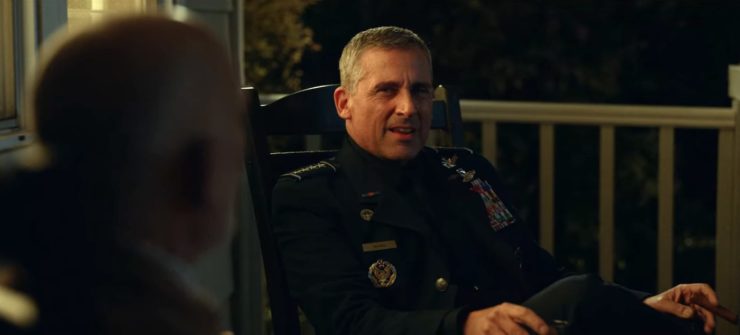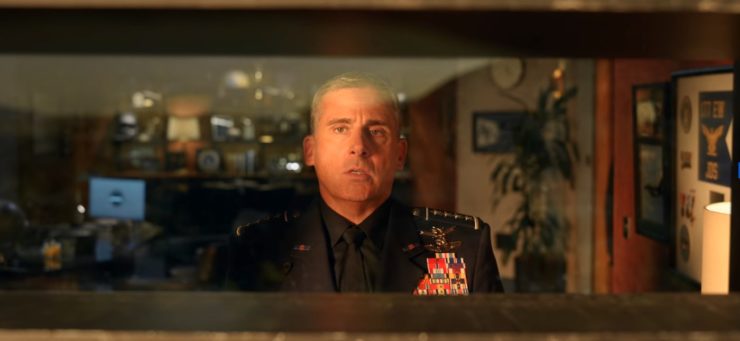Space Force has the kind of pedigree that should make for truly entertaining television. Brought to you by Parks and Rec co-creator Greg Daniels, and The Office’s resident micromanager, Steve Carell, Space Force is part office comedy (if you think of the military being run like a giant office with a ridiculous budget), part satire of our current political era. It has an impressive stable of actors and writers, and a lot of money to back up the exercise.
But satire is notorious for being the most difficult type of comedy to write effectively, and there’s a reason for that—you can’t create effective satire without knowing precisely who you are offering critique of, and why they deserve that critique. And while you would think that Space Force had the easiest job of all on that front, it turns out that no one was quite prepared to give us the scathing irony its subject matter required. And that’s a problem.
Space Force follows the trials of four-star general Mark Naird (Carell) as he becomes the man in charge of the newest branch of the U.S. military—Space Force, created to put “boots on the moon” because… well, that’s what the current President wants and that’s what he gets. Though no one is name-dropped (aside from a parody version of Alexandria Ocasio-Cortez), it is very clear who and what Space Force is attempting to deride, namely the current presidential administration and its desire for supremacy in all things.
But its very first episode undermines its ability to engage with that subject matter in any consequential or significant way.
One year in, and Space Force needs something to show for the billions of dollars being funneled into its guts. Naird is supposed to direct a few members of Congress to the launch of the Epsilon 6, a satellite that will “tangle” with enemy satellites using a great big metal net. There’s only one problem: The humidity conditions aren’t right for a space launch. Space Force’s chief scientist, Dr. Adrian Mallory (John Malkovich) is certain of this fact, and keeps trying to undercut the launch plans to his general’s dismay. Naird thinks to launch a different project called the Yellowjacket, but a test run explodes on the launchpad.
Mallory insists that Naird talk to his scientific team, so he gathers them together to elucidate why they shouldn’t send Epsilon 6 up in front of the Congresspeople. Dr. Chan Kaifang takes it upon himself to explain how humidity conditions affect fuel burn on a rocket launch. Naird casually asks Chan where he’s from. (Because, you know, if he doesn’t agree with the four-star general, he must be a Chinese spy.) He then notes that Dr. Chan has an umbrella tucked behind his back—Chan assures him that it’s not a samurai sword and asks if he would like to inspect it, which he ignores. The only person who agrees with Naird that they should go forward with the launch is a random maintenance worker named Eddie (who refuses to give his last name).
Naird’s career is on the line here, and he cannot afford a failure. He heads back to his office, does a silent dance to The Beach Boys’ “Kokomo” to psych himself up, and tells the Congresspeople that the launch will go forward as planned. That evening, he gives a speech where he calls America “the oldest democracy in the world,” presses a big red button (while Mallory presses the real button), and launches the rocket. They lose contact with the visual, but Epsilon 6 makes it into space, and Naird has made Space Force look at least semi-viable to government officials. Our protagonist has won the day, despite his multitude of naysayers.
Later on, Dr. Mallory and Naird are hanging out on the general’s porch having a drink in celebration, and Mallory thinks to ask how Naird could have possibly known the launch would work when he knows nothing about science. Naird insists that his real skill is knowing people: Dr. Chan had an umbrella with him when there was barely a cloud in the sky. “People like that can’t handle any risk at all,” he says. “There’s no way we are getting back to the moon with that kind of thinking.”

At face value, this trope can be a beautiful thing, and I’m often swayed by it the same way everyone else is. Understanding people is labelled as a “soft skill” that is often overlooked in corporate (and military) settings, and could stand to be applauded more often. And when it comes to humanity’s propensity for risk-taking as a positive factor, as Captain Kirk once famously said, “Risk is our business.” We should be proud of the risks we take when the goal is the betterment of life for those around us. We should celebrate our desire to push farther and be more in the face of adversity. We should enjoy the possibilities we unearth by refusing the simplest answer to any given question. But this trope has its limits. And the problem is, in this specific case, this line of thinking directly undermines the premise of Space Force and everything it should aim to critique.
We are in the middle of a devastating pandemic with a president who has gone on record to suggest that people inject disinfectant into their veins as a method for combating a deadly disease while he withholds or waylays vital supplies. A substantial portion of the country still doesn’t believe that climate change is a real danger while ice caps melt and ancient bacteria emerge from hiding. There has been an uptick in the number of people who believe the Earth is flat, and diseases we once had under control have made a comeback as parents all over the nation are refusing to vaccinate their kids because a judge on The Masked Singer told them it was bad a while back. Every time a renowned doctor or scientist opens their mouth to offer valuable expertise, a relative on Facebook comes back with a YouTube video crackpot who refutes those claims with conspiracy theories and nonsense. They are the Eddie-the-maintenance-workers of our lives, encouraging us to eschew knowledge for our gut feelings in every given situation.
It isn’t satire (or even good comedy) to make your protagonist a man who can succeed in spite of his education and lack of scientific expertise because he “knows people.” In this day and age, it’s fucking irresponsible.
Anything that Space Force might mean to accomplish is completely overwritten by this misstep because there is no value in exploring the can-do attitude of a Michael Scott redux who dances to oldies and gives garbled speeches at his daughter’s high school and goes on bad-yet-endearing dates with a base engineer while a milquetoast Dr. Strangelove photocopy tries to steer him away from ruin. It doesn’t matter that the series immediately shows us that Epsilon 6 fails because it gets its power source clipped off by a Chinese satellite. It doesn’t matter that it mocks the role that the president’s Twitter account has played in the current administration by giving Space Force a social media director in F. Tony Scarapiducci (Ben Schwartz). It doesn’t matter there is humanity in Naird learning to make his own rules in the face of continued negligence, or that he has to subvert the involvement of big corporate interests when he’s ordered to work with a flashy tech company, or that he accidentally outs a member of his staff while hunting for a spy that doesn’t exist. It doesn’t matter that the show cheekily winks at the truly inconceivable amount of taxpayer dollars being dumped into enterprises like Space Force every single day while citizens are homeless and hungry and incapable of planning for any kind of future.

It’s also jarring to see any branch of the U.S. military being portrayed as sweet-yet-incompetent underdogs when the president has made no secret of using military might as a means of settling personal grievances and illustrating his power. When he took office, he wanted parades with tanks in his honor. When he abruptly chose to escalate an argument with North Korean leadership, he insisted that he would “totally destroy” the nation in retaliation. When a member of his staff testified at his impeachment hearing, he suggested that the military punish him for the slight. When protests over George Floyd’s murder swept the nation, he threatened to send in military power, tweeting “when the looting starts, the shooting starts”, in an echo of a slogan used by a racist Miami police chief in 1967. On Monday, he used the cops to disperse a crowd of protestors with tear gas, flash-bangs, and horses, all so that he could have a photo-op holding a bible in front of a church. To suggest that a branch of the military created explicitly at his behest would somehow be a cuddlier, friendlier face to what we have been shown is myopic at best and devastating at worst. Even if said branch is concerning itself with the enjoyable and distracting realm of space travel.
So again, Space Force is being irresponsible in its very construction. And no amount of General Naird balking at orders while other four-star generals gamely say “yes sir” is going to alleviate that issue.
There are glimpses of a series that wanted to do more, peeking out through the mire. It acknowledges the role that blind nationalism plays on global stages. It asks what it means to be present for the people in your life, and how to support them. It offers us hijinks and shenanigans that go awry. It puts a black woman on the moon. But all of this commentary ultimately builds to nothing because Space Force refused to interrogate the real and persistent tragedy that fueled its creation. This show wouldn’t exist without the heartbreaking incompetence, ignorance, and hatred that we are witnessing all around us. Good comedy can and should address the world as it is, but this show doesn’t actually want to do that. It wants to offer up a more absurdist bent on reality, and let us find some form of comfort in a familiar story that we’ve already been told, endlessly.
There is a place for art like that. But it shouldn’t come with this name attached, and it certainly shouldn’t pretend that it’s doing anything profound or useful. We deserved better than this. We deserved something that could stand up to the terror we’re being forced to cram down our throats every day.
Emmet Asher-Perrin would be happy to see some truly scathing satire in our current times that knows what it’s about. You can bug them on Twitter, and read more of their work here and elsewhere.










